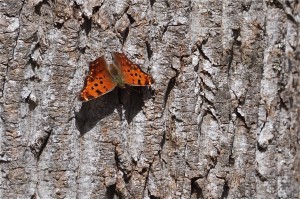The Triad Chapter of Carolina Butterfly Society had our first field trip of the 2014 season on the second full day of spring, March 22. We joined the T. Gilbert Pearson Audubon Society (Guilford County) and members of the NC Native Plant Society on a wildflower walk along Laurel Bluff Trail. Our chapter tries a late March field trip every year in the hope that we’ll see some early spring butterflies. Our target species include Falcate Orangetips and Zebra Swallowtails, although often we miss them this early. We’re more likely to see one or more of the four species of which at least some individuals spend the winter as adults, Mourning Cloak, American Snout, and the two anglewings, Eastern Comma and Question Mark, if its a mild day.
Some years the weather has been against us and we’ve had to cancel at the last minute. This time we had beautiful sunny weather that began cool but warmed nicely as our walk through the woods progressed. It wasn’t until we were returning to the trail head near noon that we finally saw butterflies. We were accompanied most of the way by what sounded like thousands of Upland Chorus Frogs singing loudly as we walked along the creek, and we found a small volcano-shaped den of some large species of crayfish next to a muddy tributary.
We saw three butterflies, a single and a pair. We knew that the butterflies were all in the anglewing group, but they were perched on trees too far away to get definitive looks at the spot patterns on their wings. At first, we thought that the first one was a Question Mark, and a few minutes later we saw two more butterflies together that seemed smaller and suggested Eastern Commas. We just couldn’t tell for sure through binoculars, though. Long distance photographs were the best we could do. When these were blown up on a computer screen later, all that were photographed turned out to be Eastern Commas, so we ended with a count of three butterflies but only one species. The attached photo is an enlargement of part of a distant shot of one of the butterflies.
Falcate Orangetips and Zebra Swallowtails were no-shows. We found one of the host plants for Falcate Orangetips, bittercress, in bloom, so the plants are ready when the butterflies emerge. Zebra Swallowtails use pawpaw trees as their caterpillar host, laying their eggs on the new emerging leaves. We found several patches of pawpaws, but none of the leaves had emerged. It may be a week or more before there is food for the swallowtail caterpillars.
We had participants from Forsyth, Guilford, Surry, and Wake Counties. It was a fun day with good companions, and a great way to officially begin the butterfly season!
Dennis
—
Dennis E. Burnette
Greensboro, NC 27410
deburnette@triad.rr.com

